As a mushroom lover, I know how important it is to find the perfect substitute for your favorite mushrooms.
Shiitake mushrooms are a popular ingredient in Asian cuisine, but they can be hard to find or expensive in some areas. Fortunately, there are several substitutes for shiitake mushrooms that you can use in your recipes.
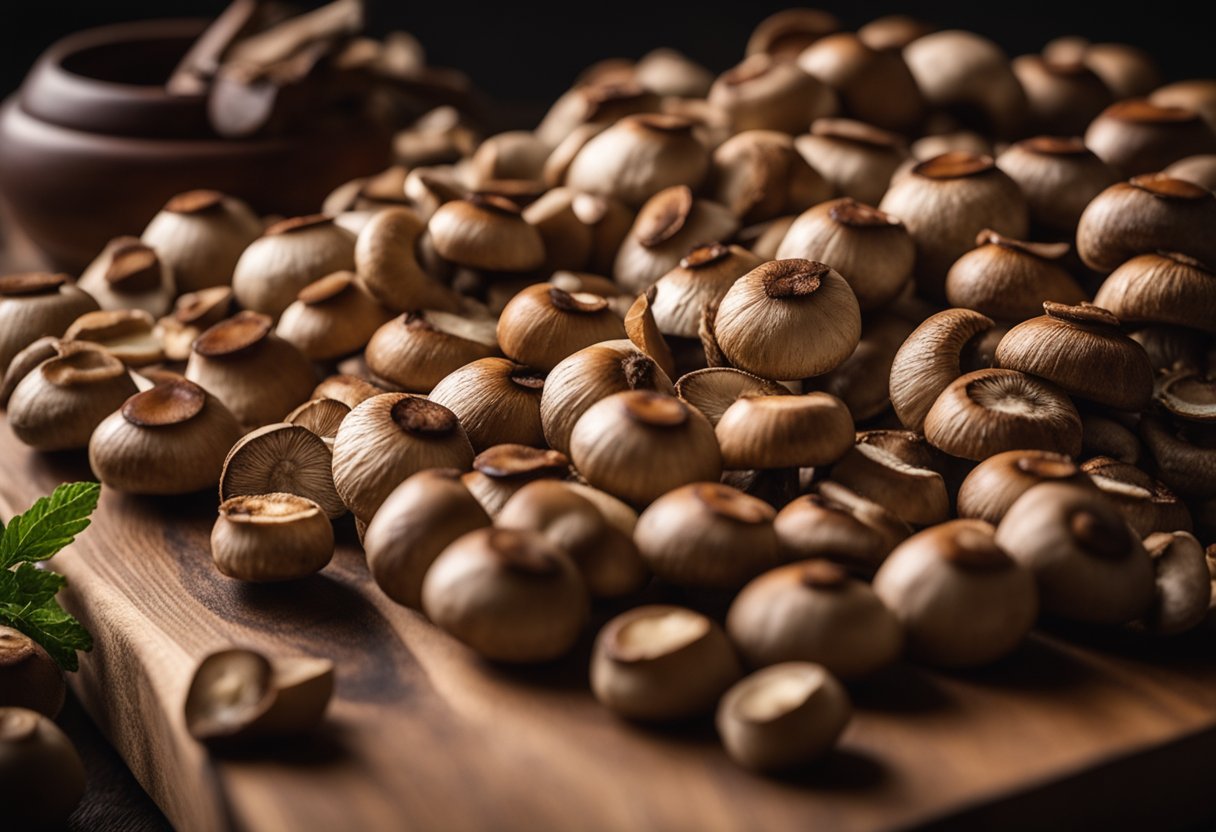
Understanding shiitake mushrooms and their common uses is essential for finding the right substitute. Shiitake mushrooms have a meaty texture and a savory flavor that makes them perfect for stir-fries, soups, and stews.
They are also rich in nutrients and have several health benefits, including boosting the immune system and reducing inflammation.
Key Takeaways
- Shiitake mushrooms are a popular ingredient in Asian cuisine, but they can be hard to find or expensive in some areas.
- There are several substitutes for shiitake mushrooms, including portobello, oyster, and porcini mushrooms, as well as button, cremini, enoki, and maitake mushrooms.
- When choosing a substitute, consider the flavor, texture, and nutritional value of the mushroom, as well as the recipe you are making.
Understanding Shiitake Mushrooms
Shiitake mushrooms are a type of edible mushroom that is commonly found in East Asian cuisines, particularly in Japan and China.
They have a unique umami flavor that is often described as earthy, meaty, and savory. This flavor is due to the presence of the amino acid glutamate, which is responsible for the umami taste.
Shiitake mushrooms have a firm and chewy texture, making them a popular ingredient in many dishes. They are often used in soups, stir-fries, and other Asian dishes. However, they can also be used in non-Asian dishes to add a unique flavor and texture.
Fresh shiitake mushrooms are more expensive than dried ones. The dried mushrooms have a stronger aroma and flavor than the fresh ones, but they need to be soaked in water to soften them before use.
Shiitake mushrooms have a mild flavor that pairs well with many other ingredients. They are often used in combination with other mushrooms, such as portobello or cremini, to create a more complex flavor profile.
Overall, shiitake mushrooms are a versatile ingredient that can add a unique flavor and texture to many dishes. Whether you are cooking Asian cuisine or experimenting with new flavors, shiitake mushrooms are definitely worth trying out.
Common Uses of Shiitake Mushrooms
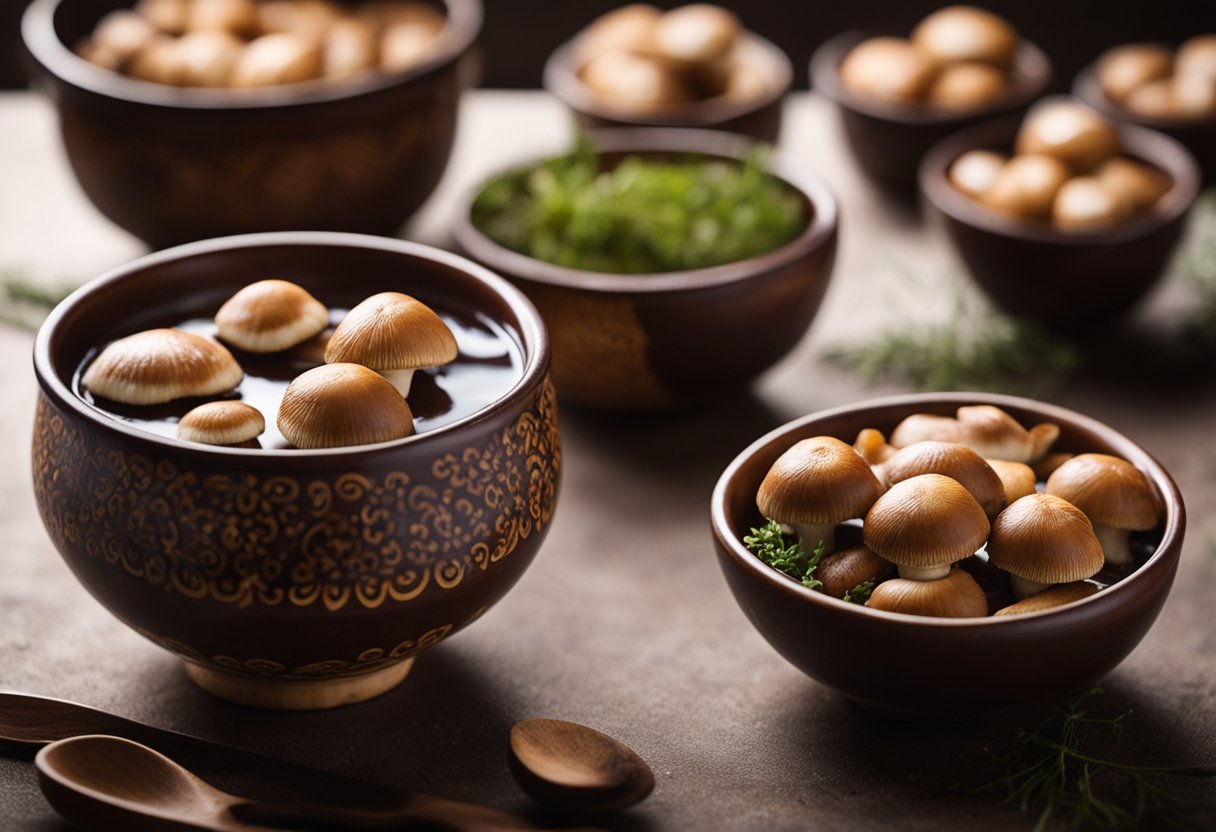
As a culinary ingredient, shiitake mushrooms are versatile and can be used in a variety of dishes. They are great in soups, stews, and broths, adding a rich and earthy flavor.
Shiitake mushrooms are also a popular addition to pasta and risotto dishes, adding a meaty texture and a savory taste.
When it comes to sauces, shiitake mushrooms are a great addition to brown sauces and pasta sauces, as they add depth and complexity to the flavor. They also work well in stir-fries, adding a unique flavor and texture to the dish.
In salads, shiitake mushrooms can be used as a topping, providing a meaty and earthy flavor. They can also be used in omelets and stuffing, adding a unique flavor to the dish.
Shiitake mushrooms are popular in Asian cooking, particularly in Chinese dishes. They are often used in appetizers and as a topping for stir-fries and other dishes.
Overall, shiitake mushrooms are a versatile ingredient that can be used in a wide range of dishes, adding a unique flavor and texture.
Health Benefits of Shiitake Mushrooms
Shiitake mushrooms are a popular ingredient in many dishes due to their unique flavor and texture. But did you know that they also offer a variety of health benefits?
Here are some of the key nutrients and health benefits of shiitake mushrooms:
Vitamins and Minerals
Shiitake mushrooms are a great source of vitamins and minerals. They are particularly rich in B vitamins, including vitamin B6, which plays a key role in brain function, and vitamin B12, which is important for red blood cell formation.
Shiitake mushrooms also contain minerals such as copper, which is important for the immune system, and selenium, which has antioxidant properties.
Fiber
Shiitake mushrooms are a good source of fiber, which is important for digestive health. Fiber helps to keep the digestive system running smoothly and can also help to lower cholesterol levels.
Nutrients
Shiitake mushrooms contain a variety of nutrients that can help to support overall health. One of these nutrients is ergothioneine, which has antioxidant properties and may help to protect against cellular damage.
Shiitake mushrooms also contain beta-glucans, which are complex carbohydrates that have been shown to have immune-boosting properties.
B Vitamins
Shiitake mushrooms are particularly rich in B vitamins, which are important for a variety of bodily functions. B vitamins play a key role in energy production, brain function, and red blood cell formation. They are also important for maintaining healthy skin, hair, and nails.
Overall, shiitake mushrooms are a nutritious and delicious addition to any diet. Whether you are looking to boost your immune system, support digestive health, or simply enjoy a tasty meal, shiitake mushrooms are a great choice.
Substitutes for Shiitake Mushrooms
As a mushroom lover, I have often found myself in situations where I want to cook a dish that calls for shiitake mushrooms, but I don’t have any on hand. Luckily, there are several substitutes for shiitake mushrooms that can be used in a variety of dishes.
One of the best substitutes for shiitake mushrooms is porcini mushrooms. These mushrooms have a similar meaty texture and earthy flavor to shiitakes, making them a great substitute in soups, stews, and risottos.
Porcini mushrooms can be used fresh or dried, so they are a versatile ingredient to have on hand.
Another great substitute for shiitake mushrooms is portobello mushrooms. These large, meaty mushrooms have a rich, earthy flavor that makes them a great substitute in dishes like stir-fries and pasta dishes. Portobello mushrooms can be sliced or diced to mimic the texture of shiitakes.
If you’re looking for a substitute for shiitake mushrooms in a recipe that calls for dried shiitakes, consider using dried porcini mushrooms instead.
Dried porcini mushrooms have a concentrated flavor and can be rehydrated to mimic the texture of dried shiitakes.
Oyster mushrooms are another great substitute for shiitake mushrooms. These mushrooms have a delicate texture and a mild flavor that makes them a great substitute in dishes like salads and sandwiches.
Oyster mushrooms are also a good substitute for shiitakes in stir-fries and soups.
Finally, if you’re looking for a substitute for shiitake mushrooms in a recipe where the mushrooms are used more for their texture than their flavor, consider using king oyster mushrooms.
These mushrooms have a meaty texture and can be sliced or diced to mimic the texture of shiitakes.
Overall, there are several substitutes for shiitake mushrooms that can be used in a variety of dishes. Whether you’re looking for a substitute for fresh shiitakes or dried shiitakes, there are plenty of options to choose from.
Portobello Mushrooms as Substitute

As a conscious eater, I always look for alternatives to my favorite ingredients that are not only healthy but also delicious. When it comes to substituting shiitake mushrooms, Portobello mushrooms are a great option.
Portobello mushrooms have a meaty texture, making them an excellent substitute for shiitake mushrooms in recipes that require a hearty and robust flavor. They are also widely available in grocery stores, making them a convenient substitute.
One of the best ways to enjoy Portobello mushrooms is by grilling them. Grilled Portobello mushrooms have a smoky flavor that can add depth to your dish. Simply brush them with olive oil and grill them until they are tender and juicy.
Portobello mushrooms are also versatile and can be used in a variety of dishes, such as stir-fries, pasta dishes, and salads. They are a great source of protein and fiber, making them an excellent addition to any meal.
In conclusion, Portobello mushrooms are a great substitute for shiitake mushrooms. They have a meaty texture, are widely available, and can be used in a variety of dishes. Try grilling them for a smoky flavor that will add depth to your dish.
Oyster Mushrooms as Substitute
As a mushroom lover, I have tried many different types of mushrooms in various dishes. Oyster mushrooms are one of my favorites due to their soft texture and mild flavor.
However, if you cannot find oyster mushrooms or if you want to try something different, there are several substitutes you can use.
One of the best substitutes for oyster mushrooms is shiitake mushrooms. They have a similar texture and flavor, making them a great alternative in vegetarian and vegan dishes.
Other substitutes include portobello mushrooms, porcini mushrooms, cremini mushrooms, and enoki mushrooms. Each of these mushrooms has a unique taste and texture, so it’s essential to choose the right one for your recipe.
When using oyster mushroom substitutes, it’s important to keep in mind that they may not have the same soft texture as oyster mushrooms.
Some substitutes, like portobello mushrooms, are meatier and have a firmer texture. Others, like enoki mushrooms, have a delicate texture and are best used in soups and salads.
Overall, oyster mushroom substitutes are a great way to add variety to your dishes while still enjoying the earthy flavor of mushrooms. Experiment with different substitutes to find the perfect fit for your recipe.
Porcini Mushrooms as Substitute
As a lover of shiitake mushrooms, I have often wondered what other mushrooms could be used as substitutes in recipes. One of the best substitutes for shiitake mushrooms is porcini mushrooms.
Porcini mushrooms are known for their earthy flavor and meaty texture, making them a perfect replacement for shiitake mushrooms in soups, stews, and other dishes.
Porcini mushrooms are available in both fresh and dried forms. Dried porcini mushrooms are often used in place of fresh mushrooms because they have a more concentrated flavor.
They are also easier to store and have a longer shelf life than fresh mushrooms.
When using porcini mushrooms as a substitute for shiitake mushrooms, it is important to note that they have a stronger flavor. This can be both a good thing and a bad thing, depending on the recipe.
If you want to highlight the mushroom flavor in a dish, using porcini mushrooms can be a great choice. However, if you are looking for a more subtle mushroom flavor, you may want to use a different substitute.
Overall, porcini mushrooms are a great substitute for shiitake mushrooms in many recipes. They have a similar texture and earthy flavor that can add depth and richness to soups, stews, and other dishes. If you are looking for a mushroom substitute, porcini mushrooms are definitely worth trying.
Button Mushrooms as Substitute
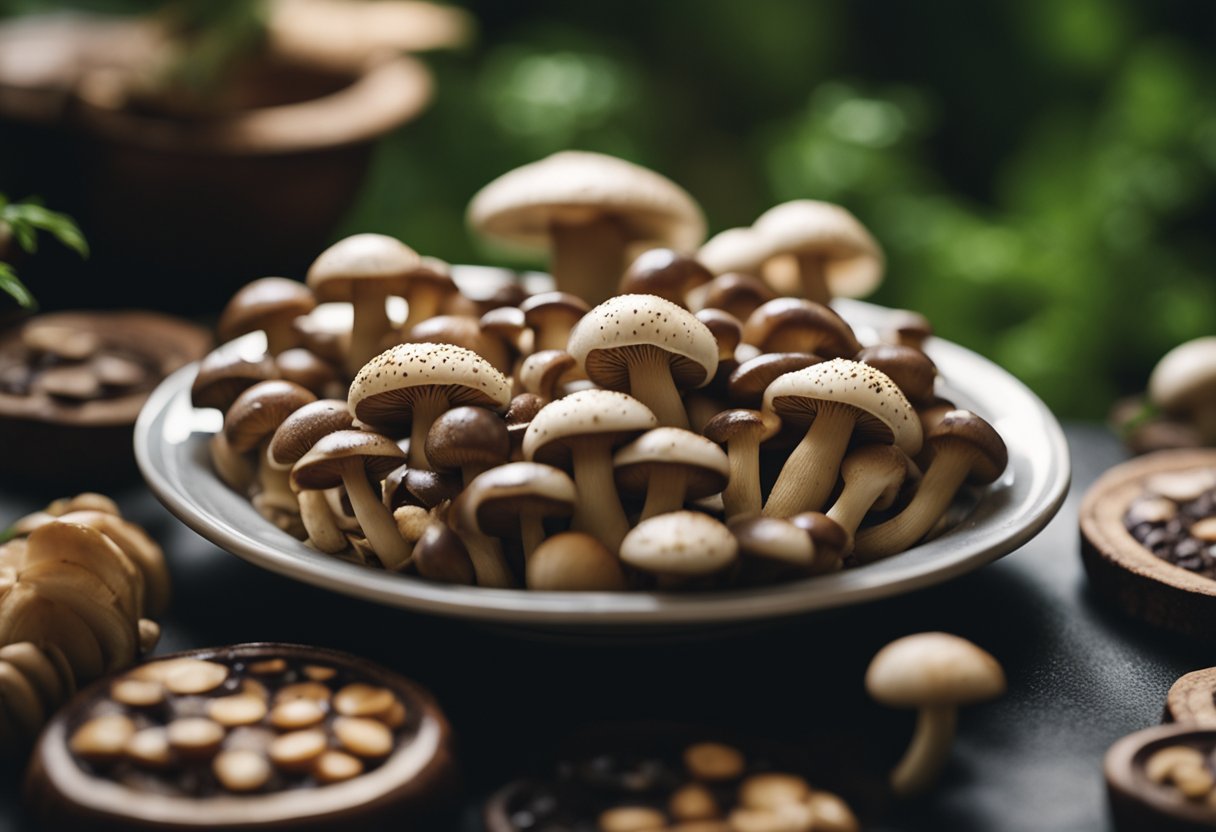
When it comes to finding a substitute for shiitake mushrooms, button mushrooms are a great option to consider. White button mushrooms, in particular, are widely available and can be found in most grocery stores.
Button mushrooms have a mild flavor that is similar to shiitake mushrooms. They are also very versatile and can be used in a variety of dishes.
One of the advantages of using button mushrooms as a substitute is their convenience. They are easy to find and can be used in a pinch when you don’t have shiitake mushrooms on hand.
To use button mushrooms as a substitute for shiitake mushrooms, simply slice them thinly and use them in place of shiitake mushrooms in your recipe.
Keep in mind that the flavor may not be as strong as shiitake mushrooms, so you may want to add some additional seasoning to your dish.
Overall, button mushrooms are a great substitute for shiitake mushrooms when you need a mild-flavored mushroom that is easy to find and convenient to use.
Cremini Mushrooms as Substitute
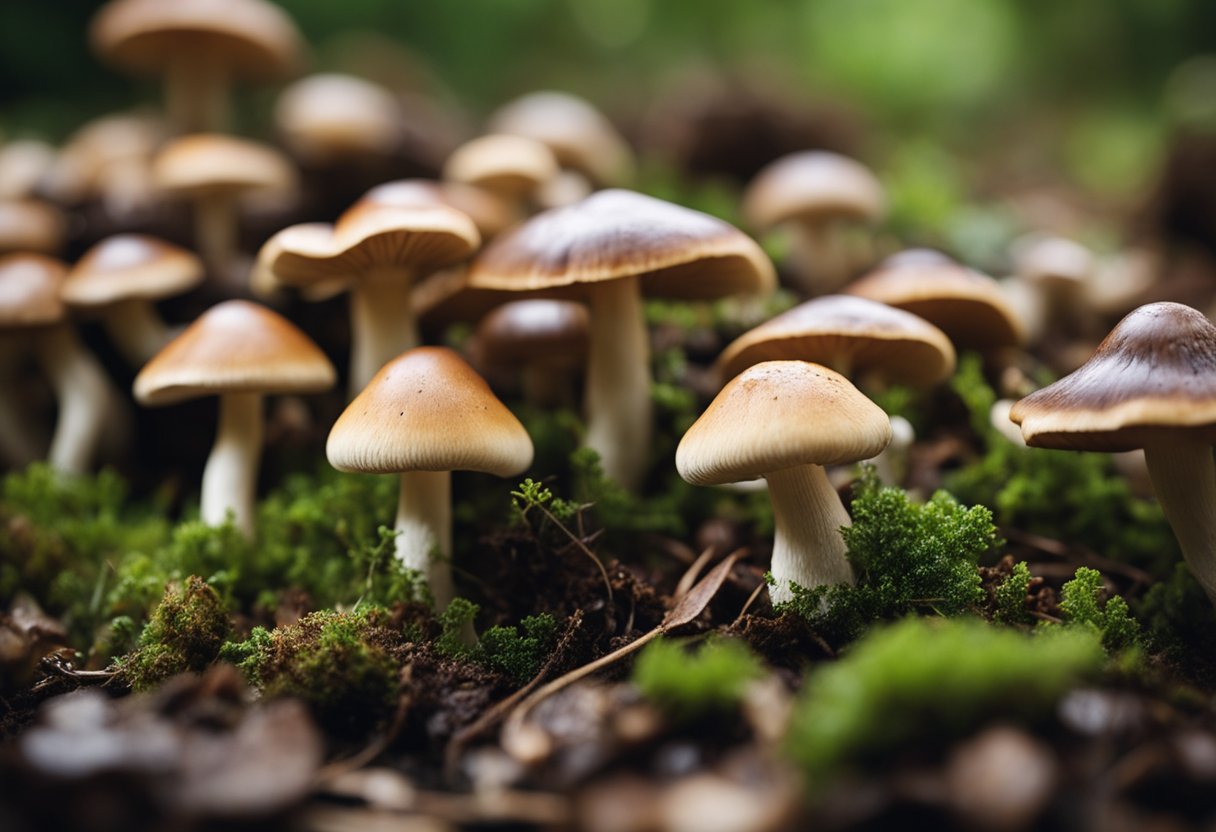
As a mushroom lover, I always keep a stock of cremini mushrooms in my fridge. But what if you don’t have any cremini mushrooms available?
Don’t worry, you can use other mushrooms as a substitute, and one of the best options is shiitake mushrooms.
Shiitake mushrooms are a great substitute for cremini mushrooms because they have a meaty texture and a rich, umami flavor.
They are also widely available and can be found fresh or dried. When using shiitake mushrooms as a substitute, it’s best to use them in dishes that call for cremini mushrooms in pasta sauces, stir-fries, and soups.
Another option is portobello mushrooms, which are larger and have a denser texture than cremini mushrooms.
They have a similar earthy flavor and are great for grilling or roasting. Oyster mushrooms are also a good substitute for cremini mushrooms, especially in dishes where you want a mild, delicate flavor.
When substituting mushrooms, keep in mind that each variety has its unique flavor and texture. It’s best to experiment and find the right mushroom for your dish.
In summary, cremini mushrooms are a versatile ingredient, but if you don’t have any on hand, shiitake mushrooms, portobello mushrooms, and oyster mushrooms are all excellent substitutes. Experiment with different mushrooms to find the perfect match for your dish.
Enoki Mushrooms as Substitute
When it comes to finding a substitute for shiitake mushrooms, enoki mushrooms are a great option to consider. Enoki mushrooms have a mild flavor and a crunchy texture, which makes them a versatile ingredient in many dishes. They are commonly used in soups, salads, and stir-fries.
Enoki mushrooms are long and thin, with small caps at the top. They have a delicate flavor that is not overpowering, making them a great substitute for shiitake mushrooms in recipes where you don’t want the mushroom flavor to be too strong.
They are also a good source of fiber and vitamins B and D.
One of the best things about enoki mushrooms is their texture. They are crunchy and slightly chewy, which can add a nice contrast to dishes that are otherwise soft or mushy.
This makes them a great addition to soups and stews, where they can add a bit of texture and crunch.
When using enoki mushrooms as a substitute for shiitake mushrooms, keep in mind that they are much smaller and thinner.
This means that you may need to use more of them to get the same amount of mushroom flavor. You may also need to adjust the cooking time, as enoki mushrooms cook much faster than shiitake mushrooms.
Overall, enoki mushrooms are a great substitute for shiitake mushrooms in many dishes. They have a mild flavor and a crunchy texture, which can add a nice contrast to soups, salads, and stir-fries.
Maitake Mushrooms as Substitute
As a mushroom lover, I always keep a variety of mushrooms in my pantry, and Maitake mushrooms are one of my favorites.
Maitake mushrooms, also known as Hen of the Woods, have a meaty texture and a rich umami flavor that makes them an excellent substitute for shiitake mushrooms.
When it comes to using Maitake mushrooms as a substitute for shiitake mushrooms, they work best in dishes that require a meaty texture and a strong umami flavor.
Maitake mushrooms are perfect for stir-fries, soups, and stews, where they can absorb the flavors of the other ingredients.
Maitake mushrooms are also a great source of nutrients, including vitamins B and D, potassium, and fiber. They are low in calories and high in antioxidants, making them a healthy addition to any diet.
In terms of availability, Maitake mushrooms can be found fresh or dried at most Asian markets and specialty grocery stores. They can be used interchangeably with shiitake mushrooms in most recipes, and they are often less expensive.
In summary, Maitake mushrooms are an excellent substitute for shiitake mushrooms when it comes to adding a meaty texture and a rich umami flavor to your dishes.
They are also a healthy and nutritious addition to any diet. So, next time you’re looking for a mushroom substitute, give Maitake mushrooms a try!
Other Non-Mushroom Substitutes
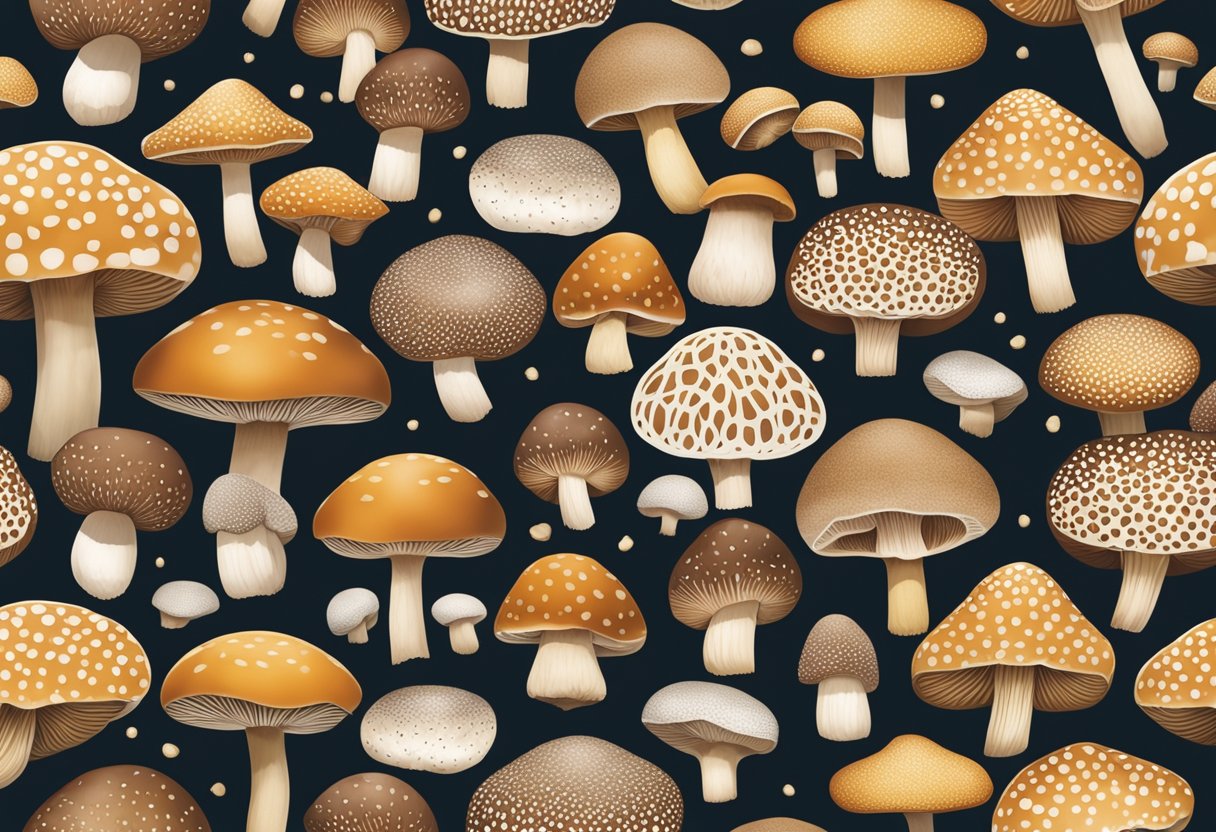
While mushrooms are a great addition to any dish, not everyone is a fan of their earthy taste. Luckily, there are several other non-mushroom substitutes you can use to achieve a similar flavor profile in your recipes. Here are some of my go-to options:
Eggplant
Eggplant is a versatile vegetable that can be used in a variety of dishes. When cooked, it has a meaty texture that makes it a great substitute for mushrooms in vegetarian or vegan dishes.
You can roast, grill, or sauté eggplant to bring out its natural sweetness and savory flavor.
Zucchini
Zucchini is another vegetable that can be used as a substitute for mushrooms. It has a mild flavor and a slightly crunchy texture, which makes it a great addition to stir-fries, pasta dishes, and salads.
You can slice, dice, or shred zucchini and use it in place of mushrooms in your favorite recipes.
Tofu
Tofu is a popular meat substitute that can also be used in place of mushrooms. It has a neutral flavor and a soft, spongy texture that makes it a great addition to soups, stews, and curries.
You can also marinate tofu in your favorite seasonings and grill or bake it for a crispy, flavorful dish.
Tempeh
Tempeh is another meat substitute that can be used as a mushroom substitute. It has a nutty flavor and a firm, chewy texture that makes it a great addition to sandwiches, salads, and stir-fries.
You can also crumble tempeh and use it as a meat substitute in your favorite recipes.
Meat Substitute
If you’re looking for a meat substitute that can replace mushrooms in your recipes, there are several options available. You can use seitan, jackfruit, or textured vegetable protein (TVP) to achieve a similar flavor and texture in your dishes.
Vegan Dishes
If you’re vegan, there are several non-mushroom substitutes you can use to replace mushrooms in your recipes. You can use any of the options listed above, as well as lentils, chickpeas, or beans.
Vegetarian Dishes
If you’re vegetarian, you can also use any of the options listed above to replace mushrooms in your recipes. Additionally, you can use cheese or eggs as a substitute in some dishes.
Overall, there are several non-mushroom substitutes you can use to achieve a similar flavor profile in your recipes. Whether you’re vegan, vegetarian, or simply not a fan of mushrooms, these options are sure to satisfy your taste buds.
Considerations When Choosing a Substitute
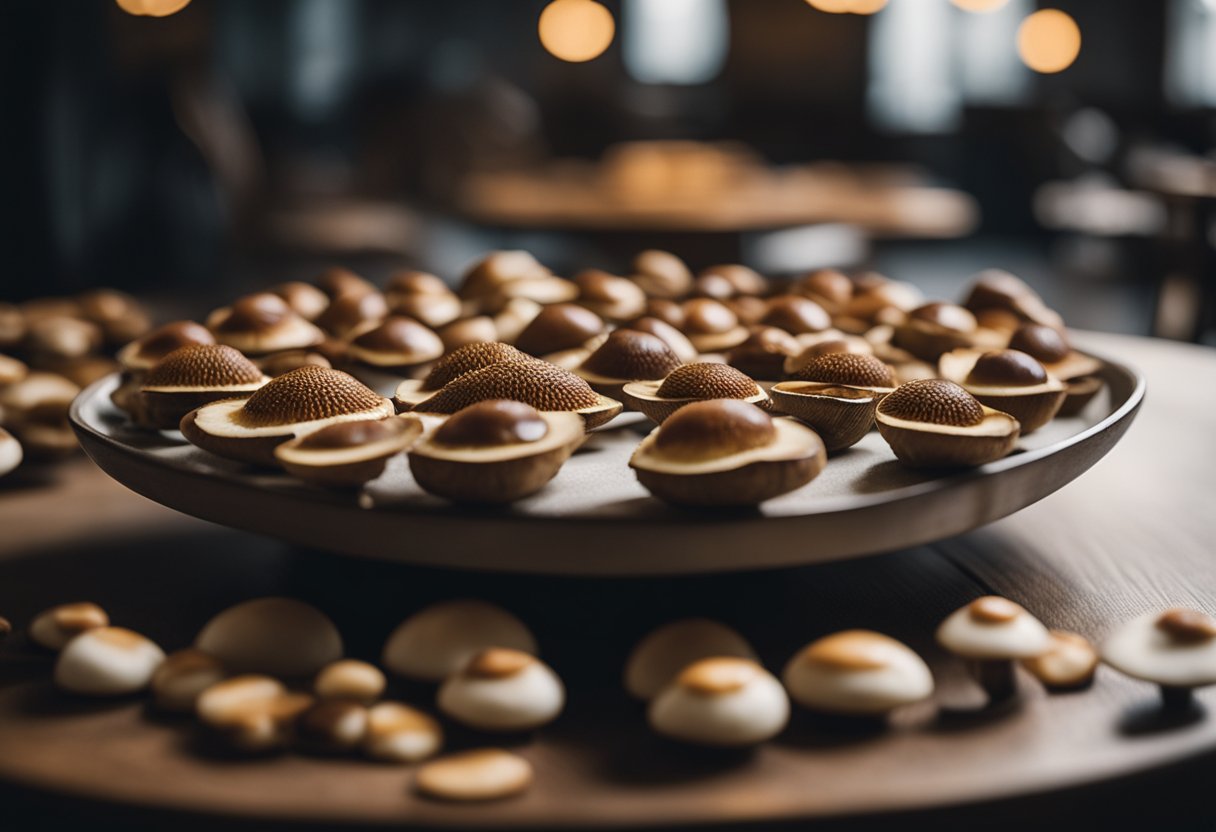
When choosing a substitute for shiitake mushrooms, there are several factors to consider.
Flavor and Texture
Shiitake mushrooms have a distinct nutty and meaty flavor, and a firm texture. When choosing a substitute, it’s important to consider the flavor and texture of the substitute.
Porcini mushrooms are a popular substitute for shiitake mushrooms, as they have a similar meaty flavor and texture. However, they can be quite expensive and may not be readily available in all stores.
Button mushrooms are a more affordable and widely available substitute, but they have a milder flavor and softer texture than shiitake mushrooms.
Cooking Time
Different substitutes may have different cooking times, which can affect the overall cooking time of your recipe.
For example, fresh mushrooms may cook faster than dried mushrooms. It’s important to consider the cooking time of your chosen substitute and adjust your recipe accordingly.
Allergies
If you or someone you are cooking for has allergies, it’s important to choose a substitute that is safe for them to eat. Some people may be allergic to mushrooms, in which case you will need to find a non-mushroom substitute.
Store Availability
Not all stores carry the same variety of mushrooms, so it’s important to consider the availability of your chosen substitute. If you’re unable to find your preferred substitute, you may need to consider other options or adjust your recipe accordingly.
Recipe
The type of recipe you’re making can also affect your choice of substitute. For example, if you’re making a soup or stew, you may want a substitute that will hold up well in liquid.
If you’re making a stir-fry, you may want a substitute that will cook quickly and evenly. It’s important to consider the specific needs of your recipe when choosing a substitute.
Overall, when choosing a substitute for shiitake mushrooms, it’s important to consider factors such as flavor, texture, cooking time, allergies, store availability, and recipe needs.
By carefully considering these factors, you can choose a substitute that will work well in your recipe and provide a similar flavor and texture to shiitake mushrooms.
Related post: Best Substitute for Golden Mushroom Soup
Frequently Asked Questions

What are some good substitutes for shiitake mushrooms in recipes?
If you are looking for a substitute with a similar texture, consider using portobello mushrooms or baby bella mushrooms. They have a meaty texture and a mild, earthy flavor that can work well in many dishes.
If you want to add a crunchy bite to your dishes, try enoki mushrooms. They have a mild flavor and a crunchy texture that can be a good substitute for shiitake mushrooms.
What are the differences between baby bella and shiitake mushrooms?
Baby bella mushrooms, also known as cremini mushrooms, have a milder but meatier flavor than shiitake mushrooms.
They are a good substitute for shiitake mushrooms in many recipes. Shiitake mushrooms have a meatier texture and a more robust flavor than baby bella mushrooms.
What is a good substitute for porcini mushrooms in cooking?
If you cannot find porcini mushrooms, you can use shiitake mushrooms, portobello mushrooms, or button mushrooms as a substitute. They have a similar texture and flavor profile to porcini mushrooms.
What are some other types of mushrooms that can be used as a substitute for shiitake?
Some other types of mushrooms that can be used as a substitute for shiitake include portobello mushrooms, button mushrooms, oyster mushrooms, and cremini mushrooms.
Each of these mushrooms has a unique flavor and texture that can work well in different dishes.
What can I use instead of shiitake mushrooms in stir fry?
If you want to make a stir fry without shiitake mushrooms, you can use a combination of other mushrooms such as oyster mushrooms, portobello mushrooms, or cremini mushrooms.
These mushrooms can add a meaty texture and a rich flavor to your stir fry.
Can king oyster mushrooms be used as a substitute for shiitake in recipes?
King oyster mushrooms can be a good substitute for shiitake mushrooms in recipes. They have a similar texture and a mild, nutty flavor that can work well in many dishes. However, they may not be as widely available as other types of mushrooms.







